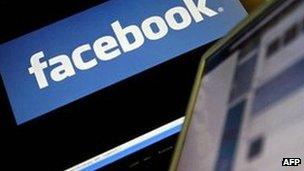Facebook's free Anti-virus Marketplace targets malware
- Published

Facebook says that only 4% of the site's content is spam
Facebook has launched Anti-Virus Marketplace - a new portal to protect the social network's users.
Members are being encouraged to download anti-malware programs which they can use at no cost for six months.
<link> <caption>The firm's flotation filing</caption> <url href="http://www.sec.gov/Archives/edgar/data/1326801/000119312512034517/d287954ds1.htm" platform="highweb"/> </link> had previously flagged the issue, saying: "As a result of spamming activities, our users may use Facebook less or stop using our products altogether."
The firm is expected to raise $5bn through the share sale before July.
The move comes three months after security firm Sophos <link> <caption>described the site</caption> <url href="http://nakedsecurity.sophos.com/2012/01/10/baby-cancer-and-heart-transplant-hoaxes-on-facebook/" platform="highweb"/> </link> as "a fertile breeding ground for hoaxes, spam and chain letters", adding that Facebook needed to "work harder than ever to reduce the havoc criminals are wreaking".
Sophos is one of the five firms with which Facebook has partnered. The others are McAfee, Microsoft, Symantec and Trend Micro.
Users are limited to installing software from one of the companies as part of the promotion.
<link> <caption>The social network also states</caption> <url href="https://www.facebook.com/notes/facebook-security/the-facebook-anti-virus-marketplace/10150672849230766" platform="highweb"/> </link> that it has expanded its web address blacklist to include dangerous sites identified by the security companies.
"This means that whenever you click a link on our site, you benefit not just from Facebook's existing protections, but the ongoing vigilance of the world's leading corporations involved in computer security," it said.
According to Facebook, spam makes up less than 4% of the content shared on its pages. It says it hopes that the project will help reduce this further.
Malicious links
"Now that Facebook is a primary platform for communication, whether you're nine or 99, it's only become a bigger target for cybercriminals," <link> <caption>said Trend Micro</caption> <url href="http://www.trendmicro.co.uk/newsroom/pr/trend-micro-announces-partnership-with-facebook-offering-users-protection-for-their-digital-life/" platform="highweb"/> </link> .
"This partnership will better enable us to protect the people who use our service, no matter where they are in the web."
<link> <caption>Sophos added</caption> <url href="http://www.sophos.com/en-us/press-office/press-releases/2012/04/facebook-partners-with-sophos-to-identify-potentially-malicious-posts.aspx" platform="highweb"/> </link> : "Because content is typically posted by a trusted source - a friend - many users incorrectly assume links are safe.
"Scammers often take advantage of the trust relationship to fool users into clicking malicious links.
"Our partnership... will educate users to make more informed decisions regarding what they click on and will help reduce the spread of malicious links."
- Published26 April 2012
- Published1 February 2012
- Published18 May 2012
- Published4 December 2011
- Published16 November 2011